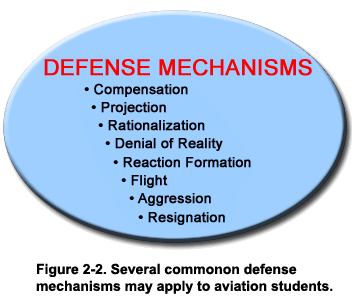
Because of anxiety provoking demands created by the id, superego, and reality, the ego has developed a number of defense mechanisms to cope with anxiety. Although we may knowingly use these mechanisms, in many cases these defenses occur unconsciously and work to distort reality. While all defense mechanisms can be unhealthy, they can also be adaptive and allow us to function normally. The greatest problems arise when defense mechanisms are overused in order to avoid dealing with problems.
Denial is probably one of the best known defense mechanisms, used often to describe those who seem unable to face reality or admit and obvious truth (i.e. "He's in denial."). Denial is an outright refusal to admit or recognize that something has occurred or is currently occurring. Drug addicts or alcoholics often deny that they have a problem, while victims of traumatic events may deny that the event ever occurred. Denials functions to protect the ego from things that the individual cannot cope with. While this may save us from anxiety or pain, denial also requires a substantial investment of energy. Because of this, other defenses are also used to keep these unacceptable feelings from consciousness.
I was told I was moving to India on the 18th September 2005 and we moved on the 4th July 2006. From the moment I found out until we actually arrived in India I was in denial about leaving. Even after packing our things and shipping them off to India I still thought (hoped) that it would all turn out to be a joke. On the plane on the way to India I was telling myself that we were just going on holiday and that I would be back in England soon. It was only after we arrived in Kodai that I finally realised that we were going to be staying here and I managed to begin to accept it.
Repression is another well-known defense mechanism. Repression acts to keep information out of conscious awareness. However, these memories don't just disappear; they continue to influence our behavior. For example, a person who has repressed memories of abuse suffered as a child may later have difficulty forming relationships. Sometimes we do this consciously by forcing the unwanted information out of our awareness, which is known as suppression, but it is usually believed to occur unconsciously.
I grew up in a difficult household. My parents were constantly fighting and I often couldn't stand to be at home. I was also physically and mentally abused by another member of my family. I used to have constant nightmares, and I still do especially when I'm going through a stressful time. My nightmares are often about my childhood and growing up although there are incidents that I don't remember happening and I am rarely able to recall what they were when I wake up.
Displacement. If you have ever had a bad day at work, then gone home and taken out your frustration on family and friends, you have experienced the ego defense mechanism of displacement. Displacement involves taking out our frustrations, feelings, and impulses on people or objects that are less threatening. Displaced aggression is a common example of this defense mechanism. Rather than express our anger in ways that could lead to negative consequences (like arguing with our boss), we instead express our anger towards a person or object that poses no threat (such as our spouses, children, or pets).
Displacement is a major problem for me. If I have had a particually difficult day at school then I will yell at the first person I see when I get home or after school has ended. Very rarely is there a reason to yell at this person other than the fact that they are their. Likewise if I have a bad time at home I may go to school and get extremely irritated with a friend.
Reaction formation reduces anxiety by taking up the opposite feeling, impulse, or behavior. An example of reaction formation would be treating someone you strongly dislike in an excessively friendly manner in order to hide your true feelings. Why do people behave this way? According to Freud, they are using reaction formation as a defense mechanism to hide their true feelings by behaving in the exact opposite manner.
This is something that I do quite often. If there is someone I really don't like I usually try to convince myself that they are a really nice person and that I would really like to become friends with them. This is not always the case, there are cases when I really don't like someone so I will try to avoid them as much as possible and when having to encounter them I will be polite but not over friendly.
Sublimation is a defense mechanism that allows us to act out unacceptable impulses by converting these behaviors into a more acceptable form. For example, a person experiencing extreme anger might take up kick boxing as a means of venting frustration. Freud believed that sublimation was a sign of maturity that allows people to function normally in socially acceptable ways.
I often uses this as a means of venting frustration. When I am frustrated or angry I will usually throw things around my room (things like paper, nothing breakable). If I'm upset I quite often write everything down on a piece of paper and then rip it up or burn it and that usually helps me to feel a lot better.
bibliography
Van Wagner, Kendra. "Defence Mechanisms." 3 Apr 2008 http://psychology.about.com/od/theoriesofpersonality/ss/defensemech.htm.
"Human behavior." 11 Nov 2003. 7 Apr 2008
No comments:
Post a Comment